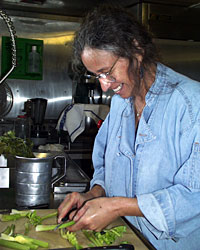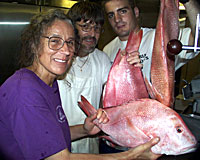|
|
Interviews: Steward Mirth Millar
Question:
How do you keep the menu so varied? I don’t think we’ve had the same thing twice. Mirth: After doing this for 14 years, I have figured out things that work together. So it’s the experience of what worked and what came together easily and what didn’t. The two things that you never put together are salmon and scallops. Those are just two foods people are just not fond of together. It’s very bizarre. Question: Knives, pots and spices must be constantly sliding all over the place in the galley when the ship rolls. How do you keep them in place? Mirth: The engineers helped to design metal bars so we can keep things tied down in rough weather. The bars keep the pots in place on the stove so nothing spills or goes sliding. We put a lot of supports up that keep things in line and everything is stored in racks. We also use these rubber mats for salad and other dishes on tables when we have heavy seas. Question: What is the most popular food request? Mirth: With almost every group, hamburgers. It’s an American thing. And shrimp. People always like shrimp. Question: You got your start at sea fishing for salmon in the Pacific Northwest. How did you transition to work aboard oceanographic expeditions? Mirth: When the fishery folded for salmon, a friend of mine in the science business connected me with people at Oregon State University and Duke University. For three years I worked as a research assistant on oceanographic cruises. On one of the cruises the mess man got strep throat and I helped out the cook. As a courtesy the captain wrote me a letter so I was able to get my merchant mariners card. Then I was eligible to become a crew member. Question: You seem to love being out at sea and your job. What do you enjoy about it? Mirth: I love to travel and I love being on the water. I love to see the sun come up and go down. I love all the incredible things that you see out here, like when a whale pops up or dolphins play tag on the bow. I have been able to see just about any place I’ve ever dreamed of seeing, except maybe China and Tibet. I do love my job, and it’s well worth the bad weather and the hard work. Question: I understand that you spend about eight months a year cooking at sea. When you get home, do you cook? Mirth: No, not for a couple of weeks. I eat out or eat potato chips and dip.
|
|||
Mailing List | Feedback | Glossary | For Teachers | About Us | Contact
© 2010 Dive and Discover™. Dive and Discover™ is a registered trademark of
Woods
Hole Oceanographic Institution
 Steward Mirth Miller has always lived and worked near the sea. “My
uncle was a commercial fisherman and members of my family are real
avid sports fishermen,” said Mirth. “I caught my first salmon
when I was seven years old.” When not broiling fish aboard Knorr,
she lives in Ocean Park, Washington.
Steward Mirth Miller has always lived and worked near the sea. “My
uncle was a commercial fisherman and members of my family are real
avid sports fishermen,” said Mirth. “I caught my first salmon
when I was seven years old.” When not broiling fish aboard Knorr,
she lives in Ocean Park, Washington.